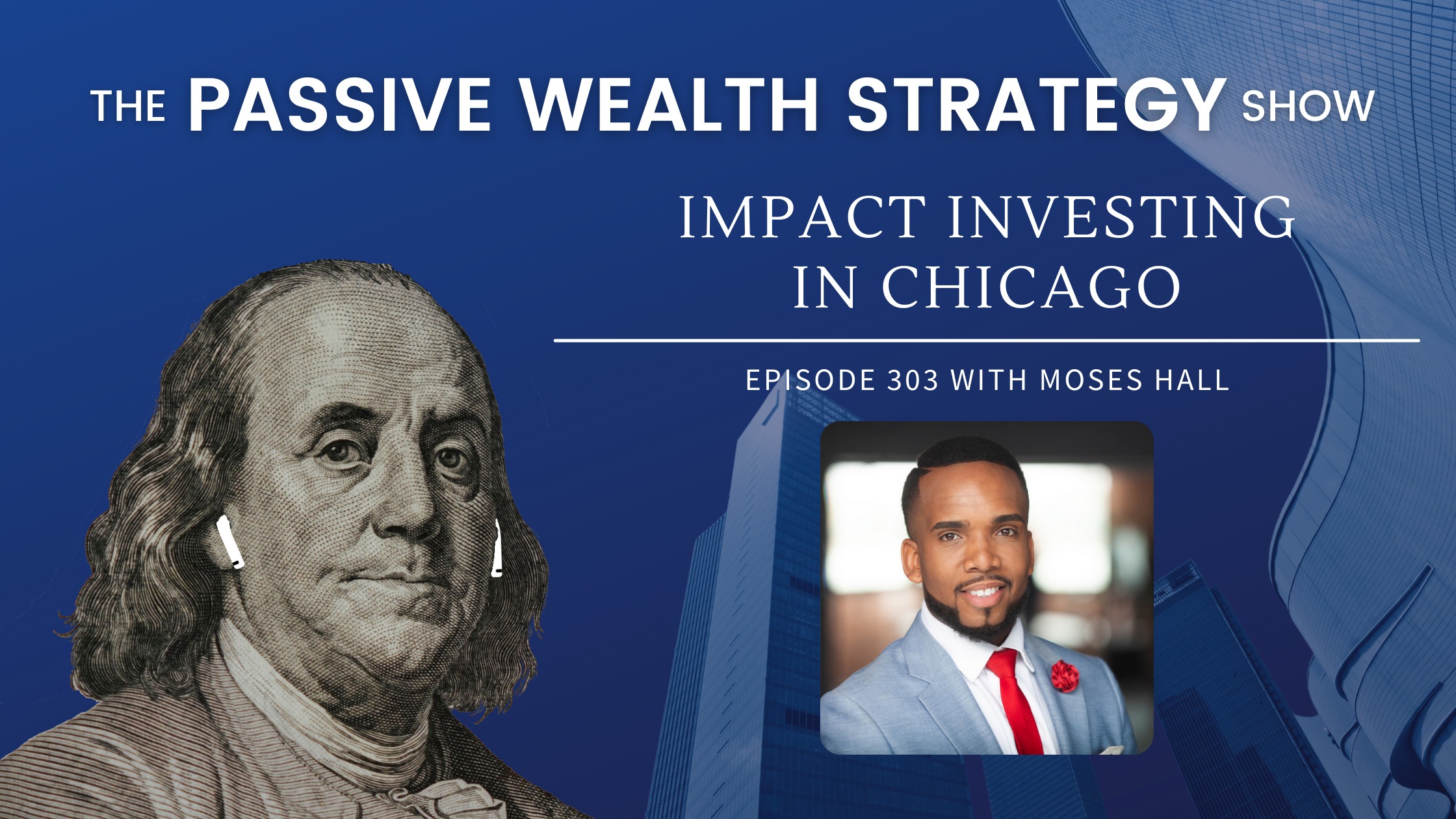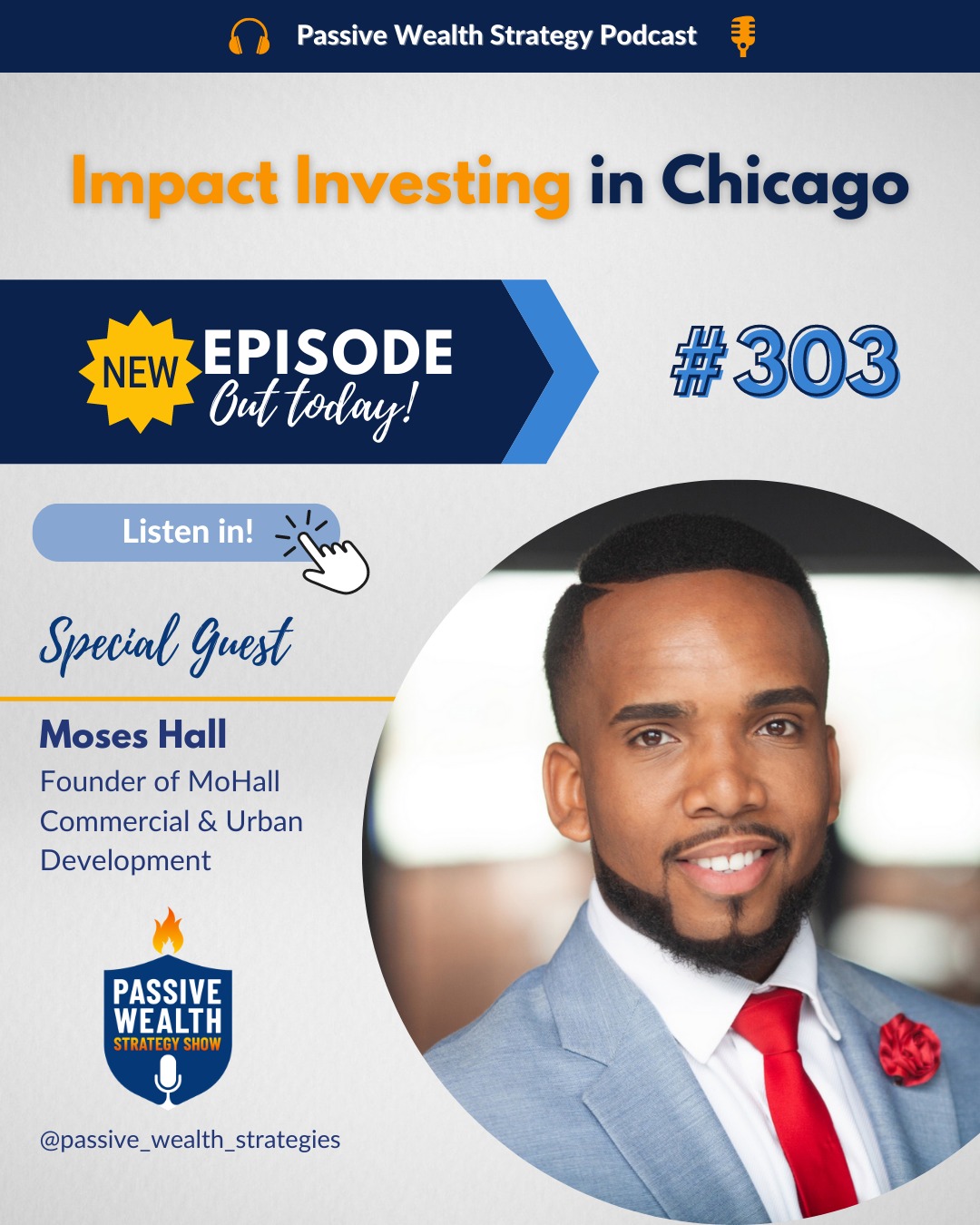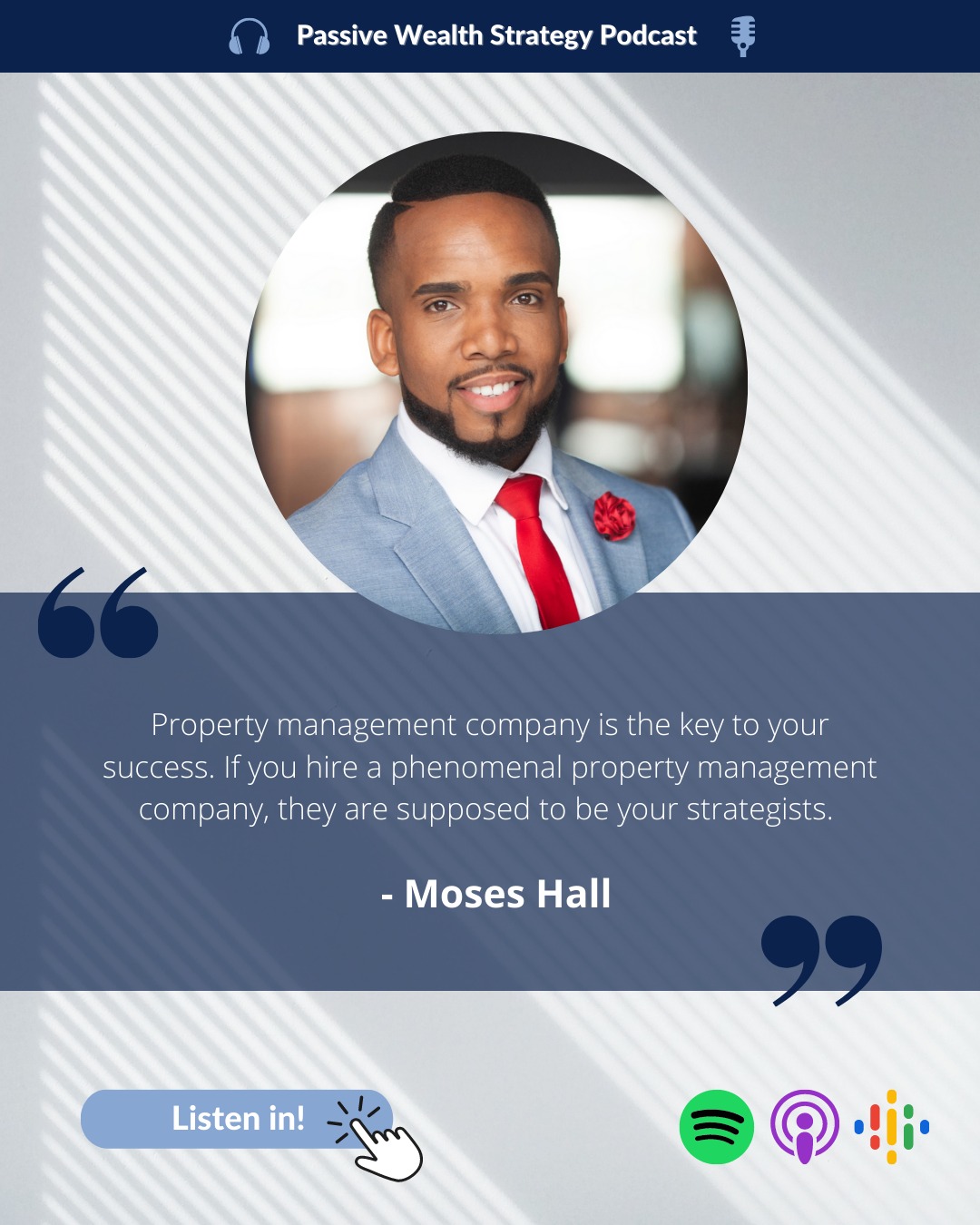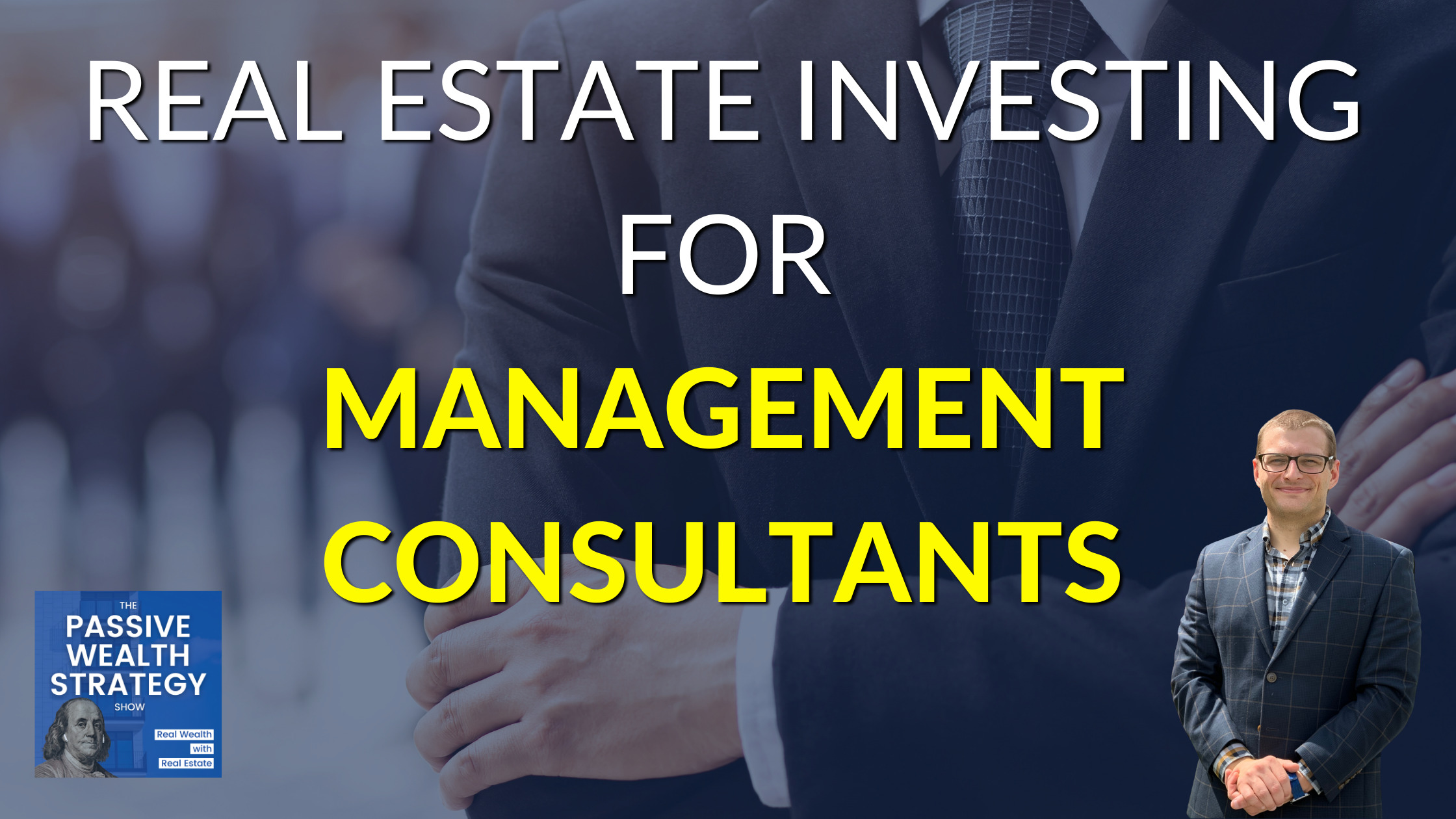
Impact Investing in Chicago with Moses Hall
Moses. Thank you for joining us today.
Thank you for having me. I appreciate the opportunity.
It’s been great chatting with you here and you’ve accomplished some really cool things being named one of the top 30 under 30 class of 2019 really impressive, and a leading broker. And we’re going to have a really interesting conversation here for our listeners out there that don’t know about you and your business.
Can you tell us a bit about your background?
Yes, my name is Moses hall. I am the founder and owner of Mohawk, commercial and urban development. We are a full-service commercial real estate, brokerage, and development company based right here in the Chicago land area. We have a commitment to revitalizing historically excluded neighborhoods and creating generational wealth for investors.
I love that. And first I want to talk about, investing with a purpose and how we can think about revitalizing some of those communities, because more now than ever in the past, I think folks are looking to make an impact with their investment. Like I said, before, we hit record, especially our generation.
We want to invest with a benefit that goes beyond the financial. Obviously, we wanna make money, but we want somebody else to benefit from other than us as well. So can you tell us? Revitalizing those communities and how you go after them. Yes.
So based here in the Chicago land area, There is a lot of opportunity for revitalization.
And there’s a way like, as you mentioned to have community impact, but also see returns on your investment. And so my company, we strategize with investors and developers and create opportunities to take that dilapidated building. It’s been vacant forever to couple it with certain government funds and grants and to restore it, to create affordable housing where now you’re seeing what we call a commercial real estate a capitalization rate.
And so here in the Chicago land area, you can see a cap rate of nine, 10%, which is pretty. Pretty good compared to other markets like New York and California, where you may be satisfied with a 4% capitalization rate. So there are ways to take blighted buildings that were vacant, torn down, and have community impact of, Provide affordable housing and then also still make a return on your money.
That’s what my company does. We assist investors, especially those that are out of state that, you may have your money sitting in a savings account and it’s not really doing much for you. We advise you on how to invest, how to identify properties. We give you a whole team from property management to insurance agents, to all different types of things from every step of the process to aid in this mission.
So like I said we specialize in the south and west sides of Chicago, which. Can we lower-income communities and we help with like I said, we’re storing some of these vacant apartment buildings, retail strip centers, and putting small businesses in these communities and also attracting anchor tenants to the community as well, providing jobs, housing, and opportunities?
I love it. I love it. Making the system work and benefit others. Now you mentioned state and local and grants and incentives, those kinds of things. Can you tell us a bit more about what those actually are at and what folks are using in their investments? In that area?
Yeah. One particular grant that the city of Chicago offers it’s called the neighborhood opportunity fund.
You can receive up to $250,000 for are revitalization of a retail storefront or a strip center. So imagine, and of course, that’s just on a smaller scale, you can go before a committed. And request a larger grant size that, as you said, it’s a grant that doesn’t have to be paid back. They want to revitalize some of these dead commercial corridors.
And here you are as an investor. If you’re trying to punch the numbers and you say, oh, here’s an opportunity. I, I saw that they’re building this development, and here’s a vacant retail strip center. I know I can grab this type of tenant and it would thrive in this, but Hey, it’s going to cost me X, Y, and Z to really build up this center to gut it and to, customize it for tenants.
I can couple it with. This grant opportunity, as I said, on a smaller scale, you can apply for up to 250,000 on a larger scale, you would have to go to a committee. I think you can get up to 3 million. So developers and investors are using these types of grant programs to make the deal make sense while still having community.
That’s great. That’s great. Now, one of the most important things, when we’re evaluating a deal is understanding the neighborhood really at a very close level, right? We want to make sure, we know what we’re looking at. Especially for your investors, your clients from out of state. What do you recommend as far as getting to know those neighborhoods and really understanding the dynamics?
I suppose, other than basically moving to Chicago.

Impact Investing in Chicago with Moses Hall
Here in the Chicago land area, there is a lot of opportunity for revitalization.
Moses Hall Tweet
The interesting thing about Chicago, it’s literally a block-by-block thing, and the only way to really learn that is to have boots on the ground for you. And so that’s what. Someone like me comes into play and navigates the Chicago neighborhoods and understands the dynamic of each area.
And also I want to, I cannot stress this enough to every investor, especially if you’re not local to your property and investment property, your property managers. The property management company is the key to your success. And I think people try to scrape dollars. Oh, I don’t want to pay someone to all they do is collect rent.
If you hire a phenomenal property management company, they are supposed to be your strategists. They are supposed to be. Go in and tell you, oh, Hey, we noticed that the water bill is a little bit high this month. I think you should. Or, Hey, we foresee this happening. I think you should push in for this or, Hey, there’s a vacancy.
I think if we put the rent here, we can secure a tenant at this. So your property manager is your eyes and ears. Once you’ve acquired this investment. I think what happens is especially here in Chicago, His investors, get excited about the pricing and the numbers. You can get a 13 unit apartment building for under a million dollars here in Chicago.
I know in California, you can barely get a two-bedroom teardown. So when they see, oh my God, I can get a whole, apartment building for under a million and their eyes get big. And they’re just looking at the numbers on the sheet, but then when they actually buy. And they realize it’s not operating the way it started it on the paper or the offering memorandum they saw.
Then they’re like, in over their heads and they’re stressing because it’s not performing. But if you have the right property management company, they can definitely turn that building around. And so I think that’s important. I want to stress to investors please take the time to do your due diligence on interviewing the right property management company.
Don’t just go for the cheapest or the largest go for the one that works. Good for your investment property.
So that is an interesting, very good point. I’ve been in a situation in the past where it wasn’t working out with a particular property manager, so we had to find actually more than one situation.
We had to find a new one. But finding that new one is very difficult and I’m thinking of one in particular. There’s a limited supply of alternatives in that case. Yes. Is how much does that happen in Chicago? Particularly in, I don’t want to be, I don’t intend to be rude about this, but if we’re talking about lower-income, maybe more kind of dangerous areas, if you will, what are your options?
There are not many. And so what happens is sometimes there’s a conflict of interest. If you get a property management company and they already own a thousand to 2000 units for themselves so what gets a priority, their buildings versus your little 12 unit that, you bought and you think that’s going to get the most attention?
I think the, what you do is you find that property, that middle kind of. The property management company can be in the weeds with you and grow with you as you grow your portfolio. As you said, don’t always go with the cheapest. Don’t always go with the most well-known you have to go and really sit down with them and see if they have a strategy.
Like you’ve mentioned their property managers are hard to find and what else. People do is they sell these ambassadors to train them. We can do this via, and then you get it. And then you realize, and I’ve literally walked into a bill. A multifamily building, walking with a shone with a buyer.
And there was a shutoff utility notice under the door because the property management company did not pay the utility. And so the seller’s agent literally called the seller like, oh my God, do you know that this, that I, he immediately fired them, but that’s what I’m saying. Little things like that. It can literally cost you your operation.
And so it is hard to find good property managers, but a steady, when you do find someone you like you say that you treat them well, you take care of them. And I, the incident. For certain property management companies is as you grow your portfolio, they can manage your portfolio. I think the way that property managers generate income is more so from the portfolio, how many do they manage?
And so if you grow with them, Then it makes sense versus, if you have the little three, four-unit, it’s not as, as enticing. So to your point, there, there is a challenge in finding good property management companies, because I always get the calls when the investor’s upside down and they just want to get out of there and basketball.
I have to do the, I, I literally have sold a building where I didn’t even have keys. I didn’t have anything. I literally had to ask a tenant to make a copy of their key, to get access to the main door. Yeah. So, I’ve been in all types of crazy scenarios, but I was able to get the building. So multiple cash offers, we got it done even in the craziness, but as I said, property management is key and for any investor out there, I definitely want to stress the importance of that.
Now, one of the things that I think about here is like, for someone that’s concerned about investing for impact, You’ve met it. We’ve touched on a few different asset classes, whether it’s you mentioned retail a little bit earlier, we talked a little bit about residential apartment buildings, things like that, in your opinion, where is the best impact to be had?
Is it fixing up our retail location and, basically helping someone abroad, jobs and housing, what do you think?
Ah, that’s a little bit challenging. It’s like the chicken or the egg, which came first. Kind of work hand in hand, I will say the last thing that ever comes to any type of community is a hotel.
So we go, that’s like the last thing that ever comes to any area, but in terms of housing or. Jobs, but normally people move to certain areas for work. Amazon has definitely been busy building warehouses here in the Chicago land area, which has provided a lot of opportunities for people moving to certain communities and things like that.
So typically jobs bring about people moving to certain areas, but also certainly. Companies don’t move to certain areas unless there’s a dummy. So it’s it really depends on the market. But w what we’re seeing is there is a need for affordable housing across the board. We see that in certain markets like New York and California, where they have.
Certain legislations such as ranked control. We see that it doesn’t work in the intended purpose. We can all agree that there is an affordable housing issue, but rent control is not the way to proceed. A comes from a federal level state level in terms of enticing developers. Because like I said, I work with developers.
If it costs me the same amount to build a luxury high-end. Building versus a low-income building, but my returns are higher. Do you know what I’m saying? I would go with the luxury. And so I think when we talk about rent control and development. It has to come from a federal state level in order for those community impacts to make sense.
Okay. Now bit earlier, you mentioned folks getting someone like you on their team and correct. I think, especially for newer folks that, that want to get into commercial. They don’t really know how to approach a broker. It’s not the same as buying a house on the MLS. Correct. So what’s the best way for someone to set themselves up for success.
If they’re coming and tracking a Moses hall down and they want to invest in the area, how can they basically get you to take them seriously?
The way I work is I answer all inquiries, all questions. That’s why I’m excited to be on this platform to share my knowledge. The way to get taken seriously by brokers is to be consistent.
Build relationships, especially if you’re local in the area, if there’s a networking event or something like that, you definitely want to build those relationships. As you said, a lot of times, as you mentioned, there may be tire-kickers people calling, oh, I’m looking and they didn’t have down payments, but I think the first hurdle is getting that first deal done.
When you show a broker that you can get one deal done. And it’s a smooth process. The rest is history. They’ll send you all their listings before it hits the market. They’ll you know, I think the biggest thing is getting that first deal done. Once you show a broker that you can close a deal, then the rest is history.
But like you say, you definitely want to. Reach out, send messages. And like I said, sometimes it may take if you are. Cause as I said, not every investor is a full-time investor. As you say, you may work on nine to five jobs and you may say, Hey, I have about. A hundred K sitting, in this account.
And then my cousin has 100 K, we want to take 200 K and take down a partner building, Hey, how can you guide us? And I think that’s, you got to keep that in mind, everyone doesn’t do this. Full-time so they’re looking for someone to guide them because like I said, it just sitting in a little savings account, getting zero 1% versus, Hey, I can tell you.
Take that same money invested. Cause you got to think about it. Like all you’re literally doing is taking money, acquiring that, buying a property. And that’s why I said your property management company is really doing all the day-to-day operations. They’re handling the calls from tenants. They’re renting it out.
They’re maintaining it. All you’re literally doing is sitting back and collecting money. What if I could tell you, you take a hundred K and you’re going to get back 50 K each year. And net operating income. That’s a pretty good return. Yeah. That’s pretty if you could take a hundred K that you got sitting in a savings account somewhere and invest it and get 50 K back a year, still working or nine to five or corporate job, so I think it’s important to build a team, not just having a broken. But having property management, having contractors, having a good insurance agent, there are so many things having a good, and I know it varies market to market, but here in the state of Illinois where an attorney state, so, we use attorneys to close.
But they do add a lot of value. A good attorney adds a lot of good value and does your due diligence when acquiring these properties. Cause as I said, a lot of times people buy these properties, they haven’t done the correct due diligence. And then they see that it’s not operating the way it was stated.
And now you’re scratching your head. Why didn’t my attorney tell me this? So yeah, so I think it’s crucial to build a team and I think the way to really build a relationship with a broker is to get that first deal done.
Text segment 3

Property management company is the key to your success. If you hire a phenomenal property management company, they are supposed to be your strategists.
Moses Hall Tweet
And then that will open up the door for you. Nice. So as I mentioned a bit earlier on the call, You were in realtor magazine’s 30, under 30 couple of years back.
And I wanted to ask you about that because. Obviously, not everybody makes that list. And what do you think sets you apart and made that success?
Possible? Yeah as I kinda mentioned, I am the broker and owner of Mohawk, commercial, urban development. And so very rarely do you find someone on the third.
In commercial real estate with their own brokerage. So that kind of set me apart as a minority as well. And then, in addition, my, my focus on community development made me stand out as well, working on these projects and doing different things with investors and developers and not only bringing.
Jobs to communities, but also bringing housing. And so those two things made me stand out from the rest and being a broker-owner, commercial real estate, and community impact.
Nice. That’s awesome. Quite the achievement. Very impressive. Right now, we’re going to take a quick break for our sponsor.
I’m Moses. I’ve got three questions. I ask every guest on the show. Are you ready? Ready? All right. Great. First one. What is the best investment you ever made other than in your education?
The best investment that I ever made it starting my company, more hall music publishing. We invest in the rights of notable famous artists.
And so anytime particular music is played on radio TV, aired on film, we collect a royalty check. And like I said, we get paid out from BMI or ASCAP. It’s like real estate investing, but intellectually.
Interesting. That is definitely a new one. Not one that I’ve heard before. Are there any artists or tracks?
We might be familiar with that.
Yeah. So have a few tracks with pop R and B artists, Chris Brown. Wow, artists, Trey songs. I have a gospel artist. I have an EDM artist that I collect royalty texts from as well. So that’s one of my best investment smart investments, whereas passive investing and we’re looking, we’re like I said, we’re just starting out where we’re also looking to grow.
I also must mention that I do have a college degree in music, business, and entertainment. So that’s what.
Came from interesting. That’s really cool. I’ve seen one or two of those sites that sell rights, but I was always skeptical as to whether that’s where really the deals were or if the real deals were, happening off-market like happiness.
Yeah. It depends. You just have to have relationships in the industry. Prior to getting to real estate, I did work at a music publishing licensing company where we licensed music on a different TV, commercials, films, and different things like that. Working on campaigns with Pepsi the Olympics and other things like that.
So that’s kinda where that background came from.
Pretty cool. That’s pretty cool. I like that. I like that. Yeah. We had the best investment. Now we’ll go to the other side of that coin, the worst investment. What is the worst investment you ever had?
That’s a tough one. I, you know what I am I appreciate my college education.
I really do. I really do appreciate the college education because it helped me mature as an adult. I made a lot of. Valuable friendships and relationships during my college years. But if I had to put a price tag on it, it was very expensive, they’re the very expensive one that normally like you said if I wasn’t an entrepreneur it would be very it’s a tough one.
As I said, I appreciate the experience and the valuable relationships. Going to college, but the actual education part to put a six-figure price tag on it. That, that’s pretty, I’m not going to say it’s the worst investment, but, if I wasn’t in real estate, I would be pretty bummed.
That got agreed. But like I said, it did force me to become an entrepreneurial ball. Being in college. The first business I actually started was being in a band and I played piano. So that’s my, my and so what happened was I was getting hired by not only my college but other colleges too.
Different events that the campus hosted. And then I realized that they were right to checkout in my name. Splitting it with other band members until I got a form text form saying I had to file taxes on this. And I realized, oh, Hey, I need to incorporate us as a corporation so that we can operate as a legit business.
And so at 19, I formed. First business and got a business account. And I shared my vision with my bandmates and we literally, at 1920 years old, were getting booked 3, 3 40 events a week while still being in college. So that, that’s why I say I, I don’t re what the college experience, but the actual price tag on it is where I go in limbo about, but yeah, so if I had to say.
Worst investment. Yeah, I have to lean on the college investment.
Yeah, I’ll take that sounds a little overpriced, but productive at the end of the day.
As I said, you have to make the best out of it. I think not to go on a tangent. I think where we miss the mark on college is that it’s perceived that if you get straight A’s that it ensures success for you, but you have to.
The reins of your own future and success, you have to be hungry for. You have to go out and get it. Whether you decide to be an entrepreneur or whether you decide to work in the corporate, you have to be hungry for you have to be relentless and never give up. I think that’s what they fell. The teaching is not just about getting straight A’s and thinking that ensures your success.
The biggest thing is about networking, building those relationships, and being. To climb to the top.
Nice. My favorite question here at the end of the show is what is the most important lesson you’ve learned in business?
The most important thing I’ve learned. There are so many lessons, real estate teaches you so many things. But I will say this being from a broker perspective, if there are any other brokers listening to this, do not count your money until it is.
Not at the calls and table until the check is in your hand and it is cleared in your account. And I know that seems super basic, but getting into this industry, a lot of people are like, oh, I’m going into real estate and we’ll make a lot of money and I’m gonna do all this stuff. And just from a broker’s perspective and investor perspective, there’s still risk that.
And I think a lot of times people get in thinking that they’re going to make a bunch of money and they don’t really calculate their risks and they get in over their head. And that’s why a lot of times, like you, said, a lot of. Buildings that people bought. They have to liquidate them because it’s not making the money in different things like that because they already started making plans.
And so I want to, realize, let people know that there’s risk involved in this industry, what you can take calculated risks to minimize those challenges that may arise. As I said, there’s a lot of points from a to Z to get those profits that we look for in real estate. So please don’t be naive thinking.
Because you got it under the contract that it’s yours or because you have to close and tell you what, that it won’t be dry clothes in, it there’s a lot of things that can happen. So I just want people to be realistic in their expectations and their goals. Getting into this industry.
Nice. That is certainly a very good lesson.
If folks want to thank you for joining us today, if folks want to reach out, they want to get in touch. They want to talk more about investing in Chicago for impact in those communities. Where can they track?
You can find me on all social media, Moses hall, M O S E S hall, H A L L. I’m on LinkedIn. I’m on Instagram.
I’m on Facebook. And you can reach me anywhere, like you said, please look me up on Google. I look forward to hearing from all of you.
Great. Thank you once again for joining us today to everybody out there. Thank you for tuning in. If you’re enjoying the show, please leave us a rating or review on the Apple Podcast.
Appreciate that so much that helps other people learn about the show that helps us rank higher in the apple podcast ecosystem. And I’m always honest with you guys that help me feel good. It gives me the warms and fuzzies, cause I know you’re engaging with the content and you’re escaping the wall street casino along with us.
If you know anyone else who could use a little bit more passive wealth in their lives, please share the show with them and bring them into. Thank you for tuning in once again. I hope you have a great rest of your day and we’ll talk to you on the next one. Bye-bye.

Moses Hall in Realtor Magazine 30 under 30
About our Guest

Moses Hall
Real estate expert Moses Hall specializes in investment property acquisitions and purchases. Born and raised in Queens, New York, he moved to Chicago to launch his career in entrepreneurship. In 2012, his first successful business was the venue & loft rental company, named “MoHall Lofts. Shortly thereafter, he transitioned to real estate full time and as a licensed REALTOR®, quickly established himself as a reliable and trusted real estate partner.
Moses graduated from the highly competitive Project Real Estate Associate Program (REAP) program in 2016 and is currently taking courses to complete his Certified Commercial Investment Member (CCIM) designation. Moses’ experience in the real estate world spans from advising first-time investors understand the complicated acquisition process to assisting experience developers add to their portfolios. He takes pride in his 5 star reviewed hands-on approach, meeting and exceeding the needs of his clients during each step of real estate process.
Episode Show Notes
Real estate expert Moses Hall specializes in investment property acquisitions and purchases. Born and raised in Queens, New York, he moved to Chicago to launch his career in entrepreneurship. In 2012, his first successful business was the venue & loft rental company, named “MoHall Lofts. Shortly thereafter, he transitioned to real estate full time and as a licensed REALTOR®, quickly established himself as a reliable and trusted real estate partner. He graduated from the highly competitive Project Real Estate Associate Program (REAP) program in 2016 and is currently taking courses to complete his Certified Commercial Investment Member (CCIM) designation. Moses’ experience in the real estate world spans from advising first-time investors to understand the complicated acquisition process to assisting experience developers add to their portfolios. He takes pride in his 5 star reviewed hands-on approach, meeting and exceeding the needs of his clients during each step of real estate process.
[00:01 – 03:41] Opening Segment
- Get to know Moses Hall
- MoHall Commercial and Urban Development
[03:42 – 10:34] Impact Investing in Chicago
- Investing with a Purpose in Communities
- How to provide affordable housing and still have returns!
- A Neighborhood Opportunity Fund
- Understanding the neighborhood at a very close level
- Why A Property Manager Matters
[10:35 – 21:09] The Right Property Management Company
- A Conflict of Interest You Should Know Of
- Growing with Property Management Companies
- Where is the best impact to be had?
- The Best Way to Set Yourself Up for Success
- Not everybody makes the Realtor Magazines’ 30 Under 30
[21:10 – 32:23] Closing Segment
- Quick break for our sponsors
- Groundfloor offers short-term, high-yield real estate debt investments to the general public. Check www.passivewealthstrategy.com/groundfloor/ to get started.
- What is the best investment you’ve ever made other than your education?
- MoHall Music Publishing
- Moses’s worst investment
- College
- What is the most important lesson that you’ve learned in business and investing?
- “Do not count your money until it is in your account.”
- Connect with my guest. See the links below.
Tweetable Quotes:
“Your property manager property management company is the key to your success.” – Moses Hall
“There is an affordable housing issue. But rent control is not the way to proceed.” – Moses Hall
“Be consistent. Build relationships” – Moses Hall
————
Connect with Moses Hall through Instagram, Facebook, and LinkedIn. Visit their website http://mohallcommercialud.com/.
Invest passively in multiple commercial real estate assets such as apartments, self storage, medical facilities, hotels and more through https://www.passivewealthstrategy.com/crowdstreet/
Participate directly in real estate investment loans on a fractional basis. Go to www.passivewealthstrategy.com/groundfloor/ and get ready to invest on your own terms.
LEAVE A REVIEW + help someone who wants to explode their business growth by sharing this episode or click here to listen to our previous episodes







